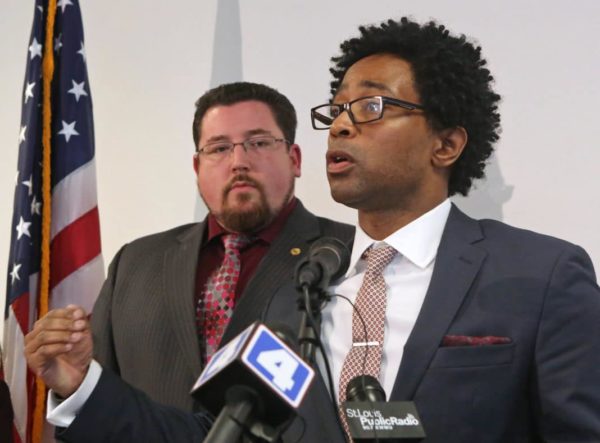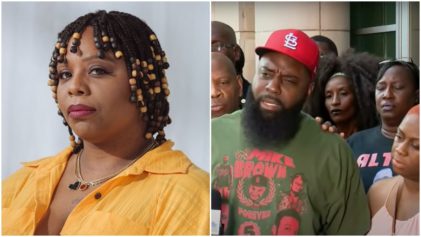
Ferguson City Councilman Wesley Bell speaks at a press conference in Ferguson, Mo. a flashpoint when he announced no charges would be filed against the white officer who killed the unarmed black teenager — is now facing his first election challenger since the shooting on Aug. 9, 2014.
St. Louis County Prosecuting Attorney Bob McCulloch, who is white, is facing Ferguson City Councilman Wesley Bell, a black, 43-year-old former prosecutor and judge who was elected to the council a year after Brown was killed. The Democrats are the only formal candidates in the race, meaning the winner of the Aug. 7 primary will run unopposed in November’s general election.
Their race brings focus back to Ferguson, a predominantly black community where months of protests over Brown’s shooting helped fuel the Black Lives Matter movement.
“I represent every protester, I represent every honest officer who’s sick of their name being drug in the mud by the actions of a few, and everyone in between,” Bell recently told The Associated Press.
His campaign website says he wants to “fundamentally change the culture” of the prosecutor’s office, partially by assigning special prosecutors to review allegations of police misconduct.
Bell and McCulloch are both sons of police officers. But McCulloch, an ardent police supporter, became a target of critics who unsuccessfully demanded he recuse himself from the Brown case, citing his family history. Several of his relatives worked for the St. Louis police department, including his father, who was fatally shot by a black suspect when McCulloch was 12.
McCulloch, who turns 67 this month, is running for his eighth four-year term as the top prosecutor in St. Louis County, where black residents make up about 23 percent of voters.
In a recent interview with AP, McCulloch defended his office and his work with the grand jury that declined to indict the officer who killed Brown. He also said he has seen increased cooperation between the community and law enforcement in the past few years.
McCulloch said his focus is on crime victims — too many of whom, he said, are black men.
“That’s something that people should be out protesting,” he said.
But some say the election is referendum on the Brown case.
“This is gonna be a defining moment in history here in the city of St. Louis,” said Jamilah Nasheed, a Democratic state senator from the city and a Bell supporter. “A lot of people are watching it.”
The dynamics of the race — a reformist challenging an established incumbent prosecutor — echo campaigns around the country, said Peter Joy, who teaches law at Washington University in St. Louis and directs the school’s Criminal Justice Clinic.
“Reform prosecutors have been elected in Brooklyn, Chicago, Denver, Houston, Philadelphia and Orlando,” Joy said.
The chances of Bell doing the same?
“I think it would be a very long shot,” Joy said. He noted that despite the criticism aimed at McCulloch, which often came from national groups, the prosecutor has a generally positive reputation in St. Louis County, which doesn’t include the city of St. Louis.
McCulloch also has a big fundraising advantage: He had nearly $250,000 — more than six times Bell’s total — at the end of June, according to the Missouri Ethics Commission. A fundraiser held for him in July was co-hosted by police officer associations from St. Louis County and the city of St. Louis.
Bell is getting extra financial help, however. A spokeswoman for Color Of Change, a California-based social justice organization, said the group’s political action committee was spending about $100,000 in advertising and outreach to unseat McCulloch.
Bell also has the support of the Ethical Society of Police, an organization of black police officers in St. Louis that seeks to address race-based discrimination in the community and the police department.
Bell could also benefit from a protest vote.
Even in 2014, when McCulloch was unopposed in the November general election, 11,000 voters wrote in the name of someone else, accounting for 4.75 percent of the vote — and that election occurred almost three weeks before more protests erupted when McCulloch announced that no charges would be filed against then-Officer Darren Wilson, who fatally shot Brown during a confrontation in the middle of a street in Ferguson.
Brown was walking with a friend when Wilson pulled up in his police vehicle and told them to walk on the sidewalk. The confrontation quickly escalated.
Wilson and witnesses said Brown attacked the officer through an open window of the vehicle, then fled and had turned back toward the officer when he was shot. Some witnesses said Brown, who was suspected of stealing from a convenience store minutes earlier, had put his arms up, though others said he had not.
Protests were almost immediate. Some turned violent and involved the looting of local businesses, and hundreds of people were arrested amid images of militarized police clashing with angry demonstrators. Mostly peaceful protests went on for months, and Brown’s parents filed a wrongful death lawsuit.
Wilson later resigned from the Ferguson police force.


